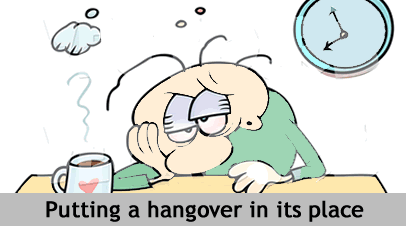Source: Trinidad Guardian November, 2012
The simple reason for a hangover is of course, drinking too much alcohol.
Dehydration is responsible for most of the nastier effects of a hangover. Alcohol is a diuretic, which means it speeds the loss of water from the body causing a parched mouth, headaches and that feeling of continual dizziness. Nausea, vomiting and indigestion are caused by alcohol irritating the stomach lining, and can add to the dehydration. A tiring night out, followed by a lack of refreshing dream sleep means you’ll feel tired the following morning. This is made worse as your body organs try to sort out the disruption you’ve caused, which also uses up energy.
Preventing hangovers:
- Not drinking is the best form of prevention…but let’s be realistic, given the time of year and fact that it’s the start of the weekend.
- Look after your body and it will look after you so avoid dehydration, protect the stomach lining and take it easy as far as the amount of alcohol you drink is concerned.
- Before you go out, eat a good meal. On this occasion only, a fatty one is beneficial as fat is digested slowly and will protect the stomach from the irritating effects of alcohol.
- A glass of milk also protects the stomach and slows the absorption of alcohol.
- While you’re out, alternating water or non-fizzy soft drinks with alcohol ones limits the amount of alcohol you consume. Avoid fizzy drinks as they increase the amount of alcohol getting into the blood-stream.
- There’s a theory that substances called congeners found in wine and spirit colourings and additives magnify the effects of a hangover. These chemicals can easily pass into the brain and disrupt the activity of the cells (within 90 seconds of taking a drink, alcohol and congeners are starting to enter the brain.) congeners also aggravate the irritation that alcohol causes to the stomach lining this may be why white wines and clear spirits such as vodka are said to cause fewer hangovers.
- Walking home in the fresh air after a night out can help to reduce the effects of a hangover. If you can’t manage this, take a taxi or get a lift from someone who’s sober-never drive.
- Before you go to bed, drink at least a pint of water and some orange juice-vitamin C speeds up the metabolism of alcohol by the liver. Eat some toast, too a lack of sugar is responsible for the wobbly, trembling feeling and it will help to settle your stomach. A sports drink is a convenient alternative.
Hangover cures:
- Everyone has their own hangover cure some work, others do not. It is best to plan ahead and have a few things close at hand.
- If you are feeling queasy, antacid liquid or tablets will settle your stomach, as will a cup of ginger tea
- Ibuprofen or Paracetamol relieves headache and anti-sickness tablets may also come in handy
- Water, vitamin C (fruit juice or tablets) and toast are the best things to consume
- Eggs are also good as they are packed with cysteine which absorbs the destructive chemicals that build up in the liver when it is metabolising alcohol
The effects of a hangover last about 24 hours, so be patient. You’ll soon feel better and be on the move again. If you are interested in receiving more information your EAP is here to help. Contact us at eap@familiesinaction.net

